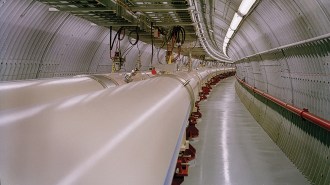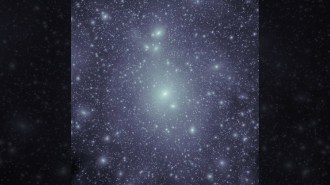For nearly half a century, physicists have scanned nuclear reactors’ radiation for evidence that the wispy fundamental particles of antimatter known as antineutrinos undergo bizarre identity transformations. Now, an international team working at an antineutrino detector in Japan reports that it has observed a particle shortfall that it attributes to this subatomic morphing act.


By indicating a type of particle behavior not included in conventional particle physics, the new findings challenge the prevailing theory, or standard model, of that field. The results also build upon recent observations of similar transformations of neutrinos–the normal-matter counterparts of antineutrinos–emitted by the sun. Given those earlier findings, the new measurements indicate that unstable identities are characteristic of all neutrino types, many scientists say.
“We are now closing in on the detailed properties of neutrinos,” comments solar-neutrino researcher Arthur B. McDonald of Queen’s University in Kingston, Ontario. “This is a major result.”
Neutrinos come in three types, or flavors–electron neutrinos, muon neutrinos, and tau neutrinos–and each of those has both matter and antimatter forms. Since the late 1950s, some theorists have predicted that as neutrinos travel long distances, they change from one flavor into another. “It’s like a lion running along, morphing into a tiger, then into a leopard, and then back into a lion,” says experimental team member John G. Learned of the University of Hawaii in Honolulu.
In 1998, researchers reported the first solid evidence of such neutrino transfigurations, which are called oscillations. The scientists were tracking neutrinos created in Earth’s atmosphere by cosmic rays hitting atoms (SN: 6/13/98, p. 374). The more recent solar-neutrino observations appeared to clinch the case for oscillations but couldn’t completely dismiss concerns that poorly understood properties of the sun itself might explain the data (SN: 5/11/02, p. 301: Available to subscribers at Detector spots solar chameleons).
Because antineutrinos can switch identities, just as neutrinos do, physicists also see the results as evidence of the consistency of physical laws in the universe, comments neutrino theorist S. Peter Rosen of the Department of Energy, in Germantown, Md., which partially funds the new experiment.
The team, which includes Learned and 91 other physicists, is performing its experiment at a huge, underground detector known as the Kamioka Liquid Scintillator Antineutrino Detector, or KamLAND. It’s located near the city of Toyama. The team looks for light flashes caused by electron antineutrinos emitted by 69 distant nuclear power reactors in Japan and Korea.
Suspended about a kilometer belowground in a mine, the heart of the detector is a weather balloon big enough to hold a school bus. The balloon is filled with some 1,000 tons of liquid, radiation-activated organic chemicals. These compounds emit light, or scintillate, when struck by fast-moving electrons such as those generated during complex reactions triggered when electron antineutrinos strike protons in the detector fluid.
After 145 days of observations at KamLAND, the experimenters report detecting only 63 percent of the electron antineutrinos that they had expected from calculations based on the reactors’ output. Their tally indicates that the missing antineutrinos morphed into muon or tau antineutrinos en route. The team announced its results in Japan on Dec. 6.
The new antineutrino findings parallel what’s been seen with solar neutrinos, notes Giorgio Gratta of Stanford University, a KamLAND co-spokesman. The data indicate that oscillations are “a property of neutrinos and not of the sun,” he says.
****************
If you have a comment on this article that you would like considered for publication in Science News, please send it to editors@sciencenews.org.
To subscribe to Science News (print), go to https://www.kable.com/pub/scnw/subServices.asp.
To sign up for the free weekly e-LETTER from Science News, go to http://www.sciencenews.org/subscribe_form.asp.







